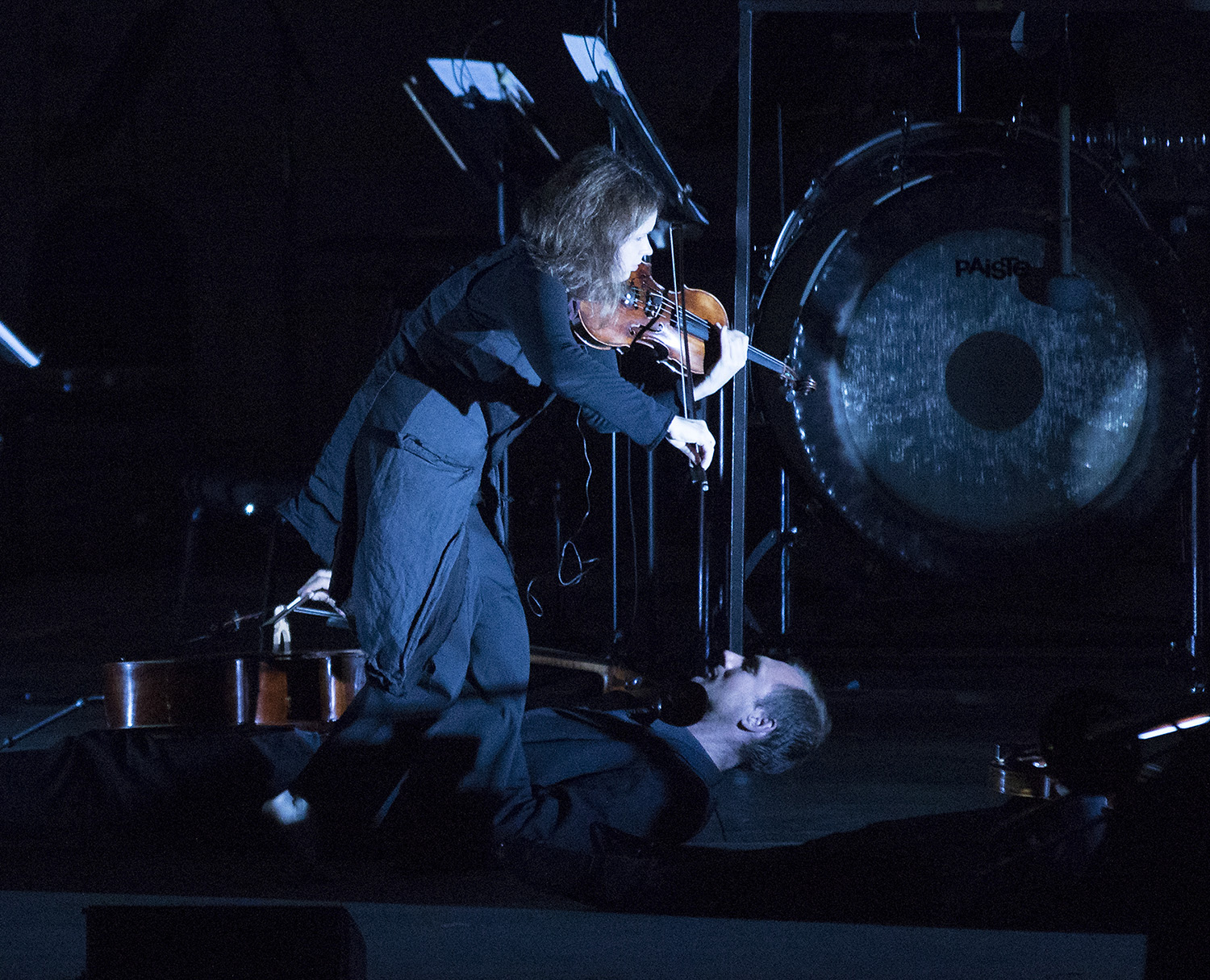2018 Ojai Music Festival
Music Director Patricia Kopatchinskaja’s Wildly Inventive Weekend

The indefatigable violinist and musical provocateur Patricia Kopatchinskaja triumphed in her role as music director of the 2018 Ojai Music Festival. In an extraordinary series of concert events, the young musician delivered surprise after surprise. From a moveable wall and crashing music stands in the finale of Thursday’s Bye Bye Beethoven to iPhones, metronomes, trombones, and musicians prone in and around Galina Ustvolskaya’s Dies irae on Saturday night, Kopatchinskaja and her collaborators created unforgettable combinations of sound and action, all while hewing closely to a well-informed and musically exacting agenda.
The opening-night concert, which featured Kopatchinskaja’s inspired take on Beethoven’s Violin Concerto in D, began in the park, where loudspeakers and a series of prop monuments inscribed as though they were the headstones of famous composers dotted the landscape. Listeners milled around, either searching for a focal point or relaxing on blankets on the grass. Luigi Nono’s piece began with Kopatchinskaja’s violin in dialogue with a variety of electronics coordinated by bassist Scott Worthington. After an hour of ambient sonics, the piece settled into a high-pitched drone that lasted until the next concert segment began. At that point, Kopatchinskaja entered the Libbey Bowl through the aisle, playing a version of the tone we had been hearing on her violin. Multiple shifts in lighting and perspective later, and she had been joined onstage by the Mahler Chamber Orchestra (MCO), who walked backwards when taking its place to the strains of Franz Joseph Haydn’s Symphony No. 45, “Farewell.” After an uproarious vocal quartet of spoken-word mayhem by John Cage, the group traveled through excerpts from Bach and Kurtág until they reached the evening’s volatile center, a chamber-music-style rendition of the Beethoven concerto. As the orchestra played, a moving wall behind the standing musicians moved closer, eventually pivoting to reveal the monuments that we had seen earlier in the park.
While there were plenty of skeptics to begin with, by the end of the Beethoven the entire audience appeared to have been converted. The high degree of musicianship and evident passion with which Kopatchinskaja and the MCO performed drove out all doubts about the eccentric staging, even when the members of the orchestra stepped forward, one by one, and knocked over their music stands at the front of the stage. The scattered stands could be read as a kind of gauntlet thrown at the start of the festival, a challenge to hear and see this music as though for the first time.
Although I was not able to attend every concert, the Ojai Festival’s dependably informative live streaming service made it possible for me to watch and listen to far more of what was offered than ever before. This is how I encountered Friday evening’s presentation, which featured an outstanding set from pianist Anthony Romaniuk, followed by the world premiere of a kind of chamber opera, I hope we get a chance to visit soon, by composer Michael Hersch. Romaniuk’s reputation rests largely on his distinctive sound as a harpsichordist, and after demonstrating that both alone and with Kopatchinskaja as his partner, he dazzled with a sequence of performances on piano, of Shostakovich, Crumb, and Ligeti. The finale of this portion of the evening came when Romaniuk was joined by the JACK Quartet for Henry Purcell’s Fantasia No. 10 in C Minor, a brilliant and moving preview of the blend of eras that would characterize Saturday evening’s early program as well.
Back in person on Saturday night, I witnessed one of the most memorable concerts I have seen at Ojai, or anywhere, as Kopatchinskaja and her stage director, Maria Ursprung, once again built a vivid and meaningful mise-en-scène for the music. Over the course of three hours, a world was created and destroyed as music from four centuries told the metaphorical story of an environmental judgment day. At the end, as musicians stood in the aisles holding metronomes, the feeling was, paradoxically, one of joy. This world may be in a terrible fix, but music and performance like this can seem, for a moment, to make it whole.



